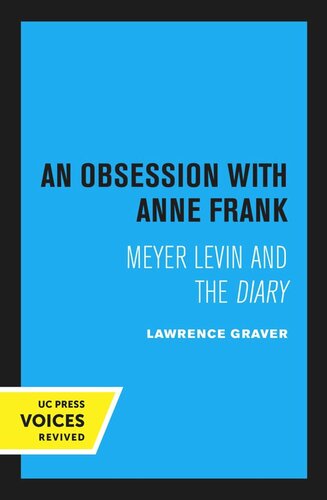

Most ebook files are in PDF format, so you can easily read them using various software such as Foxit Reader or directly on the Google Chrome browser.
Some ebook files are released by publishers in other formats such as .awz, .mobi, .epub, .fb2, etc. You may need to install specific software to read these formats on mobile/PC, such as Calibre.
Please read the tutorial at this link: https://ebookbell.com/faq
We offer FREE conversion to the popular formats you request; however, this may take some time. Therefore, right after payment, please email us, and we will try to provide the service as quickly as possible.
For some exceptional file formats or broken links (if any), please refrain from opening any disputes. Instead, email us first, and we will try to assist within a maximum of 6 hours.
EbookBell Team

5.0
60 reviewsAnne Frank's Diary has been acclaimed throughout the world as an indelible portrait of a gifted girl and as a remarkable document of the Holocaust. For Meyer Levin, the respected writer who helped bring the Diary to an American audience, the Jewish girl's moving story became a thirty-year obsession that altered his life and brought him heartbreaking sorrow. Lawrence Graver's fascinating account of Meyer Levin's ordeal is a story within a story. What began as a warm collaboration between Levin and Anne's father, Otto Frank, turned into a notorious dispute that lasted several decades and included litigation and public scandal. Behind this story is another: one man's struggle with himself--as a Jew and as a writer--in postwar America. Looming over both stories is the shadow of the Holocaust and its persistent, complex presence in our lives. Graver's book is based on hundreds of unpublished documents and on interviews with some of the Levin-Frank controversy's major participants. It illuminates important areas of American culture: publishing, law, religion, politics, and the popular media. The "Red Scare," anti-McCarthyism, and the commercial imperatives of Broadway are all players in this book, along with the assimilationist mood among many Jews and the simplistic pieties of American society in the 1950s. Graver also examines the different and often conflicting ways that people the world over, Jewish and Gentile, wanted Anne Frank and her much-loved book to be represented. That her afterlife has in extraordinary ways taken on the shape and implications of myth makes Graver's story--and Meyer Levin's--even more compelling.